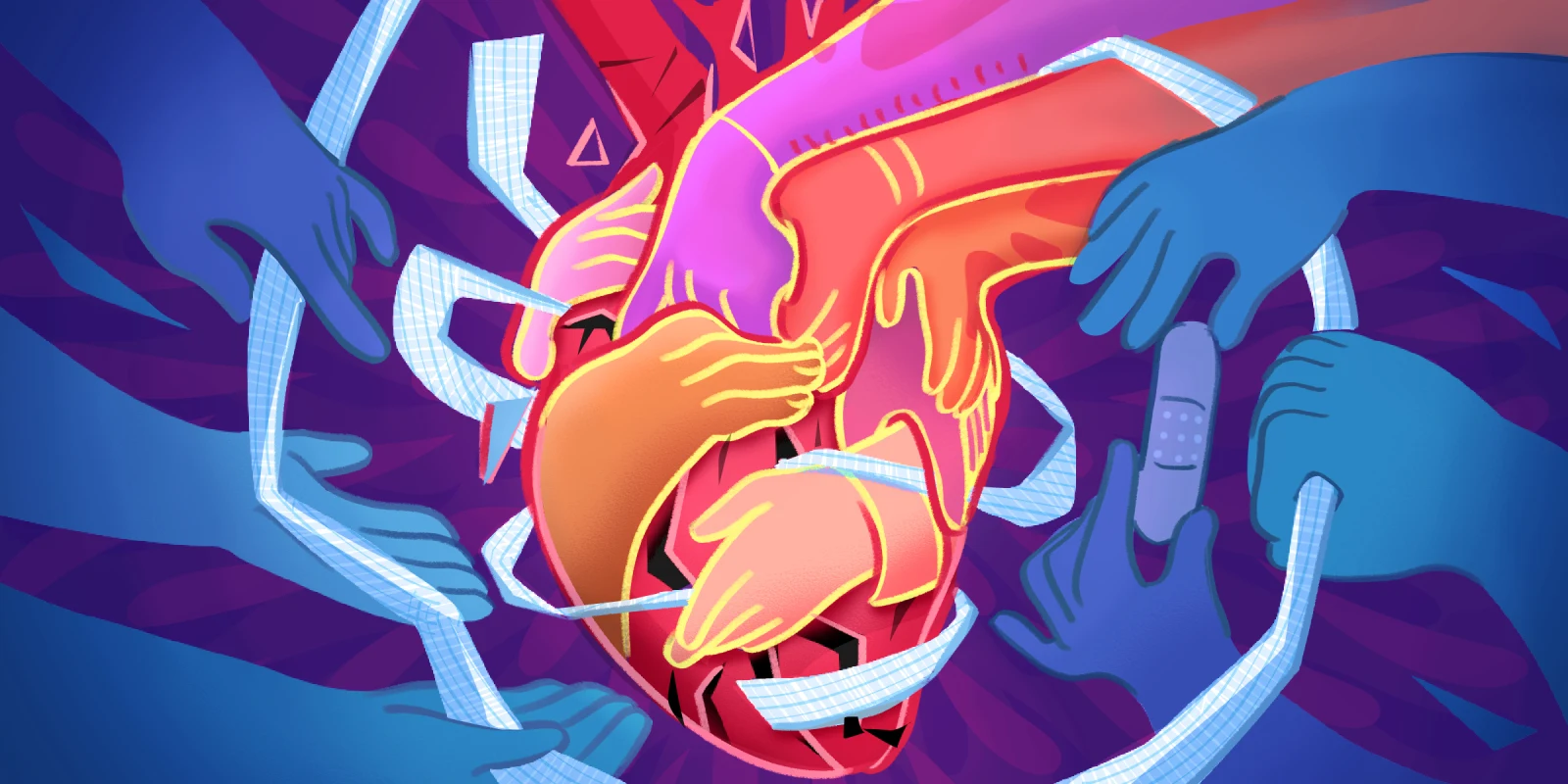What happens when a loved one becomes a patient? On Veteran's Day 2021, this exact scenario happened to me.
I’m an ER-trained pediatrician and my husband is an internist. That day, we were both off from work and looking forward to spending some leisure time together. The weather was brisk but sunny, perfect for biking. Athletic and fit for his age, my husband rode hard for two full hours, one hour longer than me. If he felt a little short of breath that morning, he didn’t mention it.
Later in the afternoon I was on the phone upstairs at home.
“You need to hang up, RIGHT NOW,” I heard a voice say. “RIGHT NOW!”
I glanced at the source of the command. My husband sat on top of the stairwell. Why was he sitting?
“I’m so sorry. I have to get going,” I murmured, abruptly ending the call.
“I’m having chest pain. I need you to drive to the hospital.”
His color was gray-green, a sickly hue.
“I am not driving you to the hospital,” I replied, reflecting upon the impossibility of driving while administering chest compressions. “I’m calling 911.”
When the EMTs arrived minutes later, they insisted on going to the nearest medical center, a local community hospital with limited resources, compared to the slightly more distant academic teaching hospital I begged them to visit. The EMTs were following protocol, but by the time the ambulance pulled away, I was tense with anger — and fear.
Due to COVID-19 restrictions, I wasn’t allowed in the ambulance. On the way to the community hospital, I willed myself into a surreal state of calm, a defense mechanism aimed at self-preservation. I drove slowly, about 40 miles per hour on the highway. Given my husband’s condition, I needed to avoid orphaning our children.
Though at that point I had worked in medicine for over 20 years, and had long had the sense that life is fragile and unpredictable, the reality of death had never felt so personal. What would I do without my husband, I wondered. If he died, would I still attend my 30th high school reunion next week? My husband is a competitive swing dancer, my partner in crime on the dance floor, the reason weddings and bar mitzvahs are always fun. In his absence, would such events be lonely and boring? Would I be forced to sell our colonial and move into a smaller, more manageable condo? Where was the will? Why didn’t I have the college fund passwords stored in my phone? Was this really happening, or was it all a dream?
My mind racing, I soon arrived at the ER of the community hospital, only to discover that the cardiac catheterization team had just finished a case and gone home. They would have to be called back in, during rush hour traffic. Unlike the academic teaching hospital, the local hospital lacked seamless coverage of the cath lab.
At that moment, my scheming brain went into overdrive. I was a problem solver. Under such conditions, what could be done to keep my husband of 20 years alive?
While my husband hummed showtunes to distract himself from the crushing pain in his chest, I remembered something important. A friend of ours worked as an interventional cardiologist in this very hospital. Years had passed since we last spoke, but her number was stored in my cell phone. When our kids did gymnastics a decade ago, we carpooled to the gym together.
“Dear Dr. R,” I texted. “I'm so sorry to bother you. I’m in your hospital’s ER with my husband. He is having a heart attack. He needs to get to the cath lab ASAP, but there is a delay. I’m worried the wait is going to kill him. Is there anyone we can call to get things moving? Thank you.”
Dr. R called almost immediately. “I’m upstairs in my office,” she said. “Don’t worry. You’re going to get through this.”
Hearing her voice and those words was an unbelievable relief. Suddenly I was tempted to cry. Knowing that physicians help not just patients, but other physicians, brought me my first moment of consolation since the ordeal began.
Five minutes later, my husband was rolled into the cath lab. Did Dr. R speed the process? Most likely. Though she wasn’t on call, she stayed late to assist the colleague who performed the procedure. Every few minutes Dr. R emerged from the lab with the warmest hugs, as well as pertinent medical updates.
“Your husband had an acute plaque rupture in the left anterior descending artery, the ‘widow maker,’” she explained. “But we were able to stent the clot and restore flow. He’s going to survive. The right coronary is also problematic. It’s 90% occluded, but that one is chronic. At some point, the vessel will need a stent.”
Some point came pretty quickly. A few hours after heading to the cardiac ICU, my husband went back to the cath lab with persistent chest pain. In hindsight, the pain likely stemmed from broken clot and plaque clogging smaller vessels downstream, which can happen after emergent stent placement. The next day, the pain had completely resolved.
The first stent, the one that saved my husband’s life, was placed through the right radial artery. Though months have passed since the hospital stay, I’m still having trouble wrapping my brain around the idea that a tiny catheter was expertly threaded through my husband’s wrist and into his heart, clearing a life-threatening blockage. To my immense relief, the interventional cardiology team at the community hospital not only saved his life, they also preserved his quality of life. Two days after the procedures, an echocardiogram demonstrated a respectable ejection fraction of 48%, with the expectation of additional recovery over time. People can argue about the broken nature of American health care, and there is certainly much to be fixed — but there is also a tremendous amount to be thankful for.
What advice can I give to other clinicians after living through this experience? Make friends with interventional cardiologists, for one. Keep aspirin in the bathroom cabinet, for another. Follow the usual heart-healthy advice — listen to your body; eat plant-based protein; avoid red meat. And finally, trust in the hospital — even if it’s not the one you’d have selected, the people who work there are still life-savers.
Although my husband’s heart attack taught me these lessons the hard way, I’m grateful for them all the same. Today, I proceed with the understanding that life is terribly short, and every minute is to be appreciated. This winter, I’ll be taking the time to love my spouse, kiss my children, and snuggle with my dog as much as possible, because there are no greater gifts.
Have you ever had a loved one become a patient? How did you approach the situation from a personal and/or clinical perspective?
Allison Beitel, MD is a practicing pediatrician and mother of three daughters.
Illustration by April Brust







